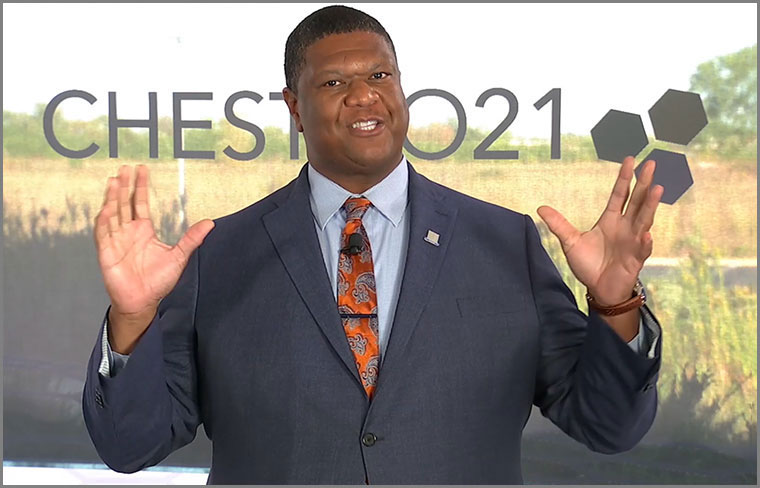“Stay motivated, persevere, and endure.”
That was the ultimate message that Demondes Haynes, MD, FCCP, left with the audience during his CHEST 2021 Opening Session Keynote Address, Perseverance and Motivation: Empathetic Medicine Amidst COVID and Beyond.
Dr. Haynes, who is Professor of Medicine, Division of Pulmonary & Critical Care, and Associate Dean for Medical School Admissions at the University of Mississippi Medical Center, began his address by acknowledging the challenges that critical care and pulmonary medicine specialists face every day—challenges that have only compounded and intensified over the past year and a half.
“I, like I imagine all of you, have endured a range of emotions over the past 18 months or so during this pandemic. I have felt fear, sadness, hope, and yes, even anger or resentment,” he said. “These are normal emotions when you deal with an unprecedented pandemic.”
He told the audience that in times such as these, it’s more important than ever for them to reflect on why they chose careers in medicine and why they chose pulmonary and critical care medicine specifically.
“I don’t know your individual stories, but I can only imagine that most of us entered the medical field to help people, and though there are many other professions in which you can do this, our profession is unique in our ability to provide lifesaving treatment, advice, medication, etc.,” Dr. Haynes said. “A life of service indeed makes me happy and excited and is but one thing that motivates me. It gives us purpose.”
That sense of purpose and the joy and satisfaction of giving, he said, is the pathway to practicing “empathetic medicine.”
“Empathy is seeing with the eyes of another person, listening with the ears of another person, and feeling with the heart of another person,” Dr. Haynes said. “We are servants, and people entrust us with their most valued possession—their life and the most intimate details of it. We must establish trust and build rapport with our patients.”
Empathy and empathic communication is not just important for patients, he said, but for the physicians, nurses, and the entire health care team who care for them.
“Research suggests that empathic people tend to be more generous and concerned with others’ welfare, and they also tend to have happier relationships and greater personal well-being,” he said. “Empathy can also improve leadership ability and facilitate effective communication.”
Those are qualities that can contribute to building a more diverse and inclusive workforce in medicine, Dr. Haynes said, as he called on health care professionals to encourage enrollment in medical programs and training for more individuals from traditionally underrepresented groups in order to build a foundation for a more representative and empathetic future of medicine.
“We can improve faculty diversity in academic medicine as well as medical student diversity,” he said. “This will lead to improved diversity in pulmonary and critical care medicine. CHEST has made great strides in diversity, equity, and inclusion, but we have more work to do.”
To make real progress, however, he said it’s time to think outside the box and look for innovative ways to foster interest in medicine and improve and expand the pipeline for underrepresented minority and ethnic groups to access careers in medicine.
“We must think about the children in middle school and high school who may not have ever considered a career in medicine,” he said.
While CHEST and the CHEST Foundation have many community outreach events and activities, Dr. Haynes said individuals can also play an important role and do their part by engaging with their own communities, such as volunteering at a local school on career day, particularly in schools in urban areas and public schools that are under-resourced.
“The work you do will be invaluable in the lives of those children, and the empathy you gain and display will improve your life as well. I’m certain of that,” he said. “Who knows, you might inspire a young, underrepresented, low-income male to desire to become a physician—a pulmonary/critical care physician—pursue a career in academic medicine, rise through the academic ranks, become a medical school Admissions Dean, and one day serve as the keynote speaker at the CHEST annual meeting.”
ACCESS SESSIONS ON DEMAND
Registered CHEST 2021 attendees have continued access to 200+ educational sessions until October 1, 2022. Watch sessions on your own schedule and earn up to 50 CME credits/MOC points.
Don’t forget to claim your credit! The deadline is December 15, 2022, at 11:59 pm CT.




